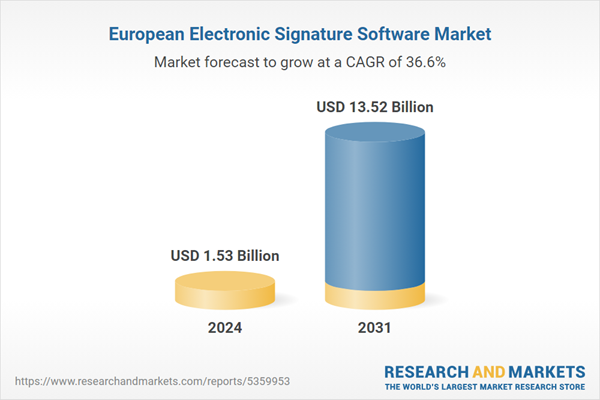The Europe electronic signature software market is segmented into France, Germany, Russia, Italy, the UK, and the Rest of Europe. UK dominated the market in 2024, followed by Germany and France, respectively. With a strong regulatory framework in place, including the eIDAS (electronic Identification, Authentication, and trust Services) regulation, the region has seen an increase in the adoption of electronic signatures across sectors such as banking, insurance, and legal services. Countries such as Germany, the UK, and France have been at the forefront, emphasizing secure digital transactions.
The region's stringent data protection laws, such as the General Data Protection Regulation (GDPR), further promote the need for secure and verifiable electronic signatures. As more financial transactions move online and electronic signatures become essential for secure, legally binding agreements, the need for widespread digital literacy and trust in digital platforms grows. The uneven financial literacy across Europe could influence the rate of adoption of electronic signature solutions, with higher levels of literacy in certain countries potentially driving quicker integration and usage of electronic signature technologies.
Additionally, the growing importance of secure digital financial services in Europe, particularly in light of initiatives such as the eIDAS regulation for electronic identification and trust services, is likely to propel the electronic signature software market. As European consumers and businesses continue to rely on digital payments and online financial services, the demand for reliable and user-friendly electronic signature solutions is expected to rise, further aligning with the region's efforts to enhance both financial and digital literacy.
In terms of end user, the Europe electronic signature software market is divided into BFSI, IT and telecom, pharmaceuticals, government, retail and e-commerce, legal, and others. The BFSI segment held the largest Europe electronic signature software market share. Almost all financial transactions, including loan applications, account openings, and investment agreements, require signatures. Electronic signatures simplify these processes by providing timestamp and audit log features essential for regulatory compliance and fraud prevention. They also reduce the time and cost associated with traditional manual signatures, enhancing both operational efficiency and customer satisfaction.
Similarly, the insurance industry relies heavily on the exchange of contracts, policy documents, and claims forms. Electronic signatures allow insurers and policyholders to sign and process documents swiftly and securely. By adopting electronic signatures, insurance companies can optimize policy issuance, claim processing, and underwriting, resulting in shorter turnaround times and enhanced customer satisfaction.
Zoho Corp Pvt Ltd, sproof GmbH, DocuSign Inc., Adobe Inc, EDICOM, Signable, secrypt GmbH, Aruba S.p.A, D-Trust GmbH, and Yousign are among the key Europe electronic signature software market players that are profiled in this market study.
The overall Europe electronic signature software market size has been derived using both primary and secondary sources. Exhaustive secondary research has been conducted using internal and external sources to obtain qualitative and quantitative information related to the Europe electronic signature software market size. The process also helps obtain an overview and forecast of the market with respect to all the market segments.
Also, multiple primary interviews have been conducted with industry participants to validate the data and gain analytical insights. This process includes industry experts such as VPs, business development managers, market intelligence managers, and national sales managers, along with external consultants such as valuation experts, research analysts, and key opinion leaders, specializing in the Europe electronic signature software market.
Reasons to buy:
- Save and reduce time carrying out entry-level research by identifying the growth, size, leading players, and segments in the Europe Electronic Signature market.
- Highlights key business priorities in order to assist companies to realign their business strategies
- The key findings and recommendations highlight crucial progressive industry trends in the Europe Electronic Signature market, thereby allowing players across the value chain to develop effective long-term strategies
- Develop/modify business expansion plans by using substantial growth offering developed and emerging markets
- Scrutinize in-depth market trends and outlook coupled with the factors driving the market, as well as those hindering it
- Enhance the decision-making process by understanding the strategies that underpin commercial interest with respect to client products, segmentation, pricing and distribution
Table of Contents
Companies Mentioned
Some of the leading companies in the Europe Electronic Signature Software Market include:
- Zoho Corp Pvt Ltd,
- sproof GmbH,
- DocuSign Inc.,
- Adobe Inc,
- EDICOM,
- Signable,
- secrypt GmbH,
- Aruba S.p.A,
- D-Trust GmbH
- Yousign
Table Information
| Report Attribute | Details |
|---|---|
| No. of Pages | 119 |
| Published | April 2025 |
| Forecast Period | 2024 - 2031 |
| Estimated Market Value ( USD | $ 1.53 Billion |
| Forecasted Market Value ( USD | $ 13.52 Billion |
| Compound Annual Growth Rate | 36.6% |
| Regions Covered | Europe |
| No. of Companies Mentioned | 10 |









